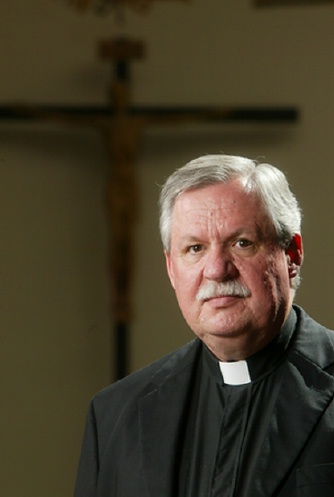
The Risen Christ, who was Jesus of Nazareth, knows human suffering, because he suffered in his humanity. To enter into the mystery of his Eucharist, we must understand that there is a fundamental identity between Jesus’ experience of suffering and ours.
We must grasp this identity. Suppose in the place where you work, you recognize that something dishonest is being done, or that the company is discriminating against a person or group of people. You might decide to speak up, to be a whistleblower. That would be the right thing to do. But it could easily bring you opposition, anger, or resentment. People might talk about you behind your back and misrepresent what you said. Your speaking out might even cost you a promotion or your job. Your suffering in this case is an exact partner to Jesus’ suffering: you stand for justice and so are persecuted, just as he was. This mistreatment is what Jesus experienced when he was brought before the religious authorities and the Romans.
Suppose you need to make certain decisions in your family about finances, where and when to vacation, what curfew to establish for your children, or whether to challenge a parent on drinking too much. This decision might be bad news for the hearer: “We can’t take our usual, week-long vacation this year.” “You have to be home at midnight.” And you are anxious about the backlash when you announce this decision. Your anxiety is the same as Jesus’ anxiety in the Garden: “I must do what is right, but I will suffer if I do.”
Suppose you lose your job because you’re a whistleblower, or your husband leaves you without an income to marry a much younger woman, or if your children stop talking to you for a while, then they have crucified you. You are innocent, but they mistreat you.
(Remember too the converse: if you are the husband leaving an older wife, or a spouse having an affair, or a child snubbing a parent, you have crucified them.)
In these cases your suffering is the same suffering Jesus endured. And the remedy is the same: don’t be tempted to give up on God (next post); yield to the Father’s love (following post); and meet Jesus in his Eucharist where his broken body and blood poured out brings an anointing of the Father’s love on all who are gathered together.
We live Jesus’ Eucharist in our daily lives as we act rightly and justly, take on the suffering that right acting evokes, and receive the Father’s love that carries us into new life.

1 comment:
10 commandments Anyone heard of this nee 10 commandments animated file with Christian Slater as the voice of Moses?
Post a Comment